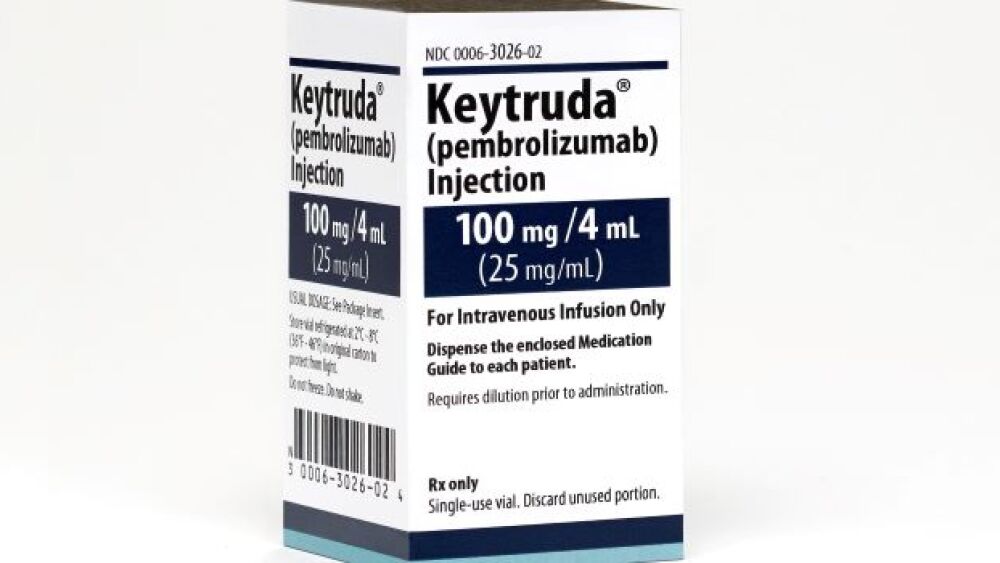Phase III KEYNOTE-671 study data showed Merck’s Keytruda improved event-free survival, one of the trial’s primary endpoints, in patients with stage II, IIIA or IIIB non-small cell lung cancer.
Courtesy of Merck & Co. Inc.
After a rocky start to the week, Merck’s Keytruda (pembrolizumab) scored a win Wednesday in non-small cell lung cancer (NSCLC).
Phase III KEYNOTE-671 study data showed Keytruda improved event-free survival, one of the trial’s primary endpoints, in patients with stage II, IIIA or IIIB NSCLC.
The company will continue to assess overall survival (OS), the trial’s other primary endpoint.
Aside from the clinically meaningful improvement in EFS, Keytruda also hit key secondary endpoints, such as complete and significant pathological responses.
These results come from a pre-specified interim analysis of KEYNOTE-671. The randomized and double-blinded trial compared Keytruda against placebo as a perioperative treatment in NSCLC patients. A total of 786 patients were enrolled.
Patients received Keytruda plus chemotherapy before tumor resection in the active treatment arm, followed by single-agent Keytruda after the procedure. Meanwhile, comparators received placebo plus chemotherapy before surgery and placebo monotherapy after.
KEYNOTE-671 also assessed the safety of the Keytruda regimen compared to placebo and found no new safety signals.
The findings from KEYNOTE-671 build the case for moving Keytruda into earlier stages of NSCLC, which could “significantly reduce the risk of recurrence for these patients,” Eliav Barr, senior vice president, head of global clinical development, chief medical officer, Merck Research Laboratories, said in a statement.
With these data, Merck has submitted a supplemental Biologics License Application seeking to expand Keytruda to this indication. The target action date is Oct. 16.
Keytruda’s Dual Defeat
Keytruda’s NSCLC win comes one day after the blockbuster drug posted back-to-back flops.
Results from the Phase III KEYNOTE-641 trial released Tuesday showed that when combined with Pfizer’s Xtandi (enzalutamide) and androgen deprivation therapy (ADT), Keytruda did not demonstrate significant benefit in terms of radiographic progression-free survival (rPFS) or OS relative to placebo.
This lack of treatment effect satisfied a pre-specified futility threshold for OS. In line with the recommendations of an independent Data Monitoring Committee, Merck is discontinuing KEYNOTE-641.
This is not Keytruda’s first failure in prostate cancer.
In August 2022, the PD-1 inhibitor missed its primary endpoints in the KEYNOTE-921 trial. The Phase III trial compared Keytruda against a placebo in 1,030 patients with metastatic castration-resistant prostate cancer. Both treatment arms were also given prednisone and chemotherapy.
KEYNOTE-921 measured efficacy in terms of rPFS and OS. For both metrics, Keytruda failed to differentiate itself from the placebo.
Keytruda recorded another prostate cancer failure in January when results from the Phase III KEYNOTE-991 study found the blockbuster drug had no significant impact on rPFS and OS in metastatic hormone-sensitive prostate cancer. KEYNOTE-991 assessed Keytruda in combination with Xtandi and ADT.
Merck also discontinued KEYNOTE-991.
Tuesday’s second data drop revealed that Keytruda fell short of the dual endpoints of OS and PFS in KEYNOTE-789, a Phase III trial in metastatic nonsquamous NSCLC patients with EGFR-genomic tumor mutations and who had previously seen disease progression after treatment with a tyrosine kinase inhibitor.
In the study, Keytruda was combined with pemetrexed and platinum-based chemotherapy.






